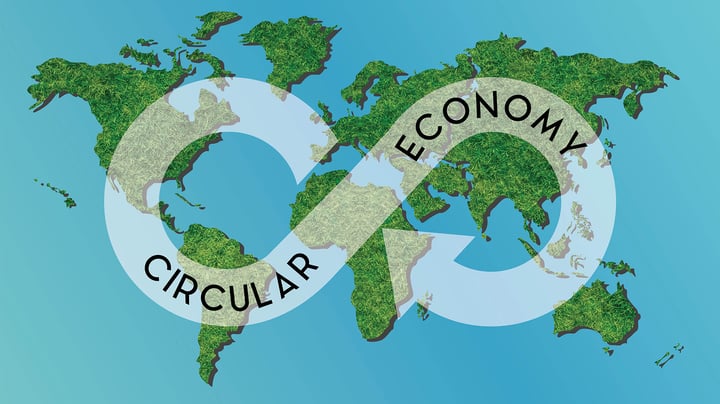Academic Excellence
Jul 11, 2019 • aston business school • manufacturing • Professor Tim Baines • Christian Kowalkowski • Servitization • Servitization Conference
Now in its eighth year and welcoming over 80 delegates from all over the globe, the Spring Servitization Conference focused on the impact of digitalisation and sought to affirm the benefits this discipline can bring to service in manufacturing. Attending the event in Linköping, Sweden, Mark Glover spoke to some of the keynote speakers and academics to gauge how important this gathering is...
Located in Southern Sweden, Linköping is the country’s seventh largest city. However, its dwarfed in comparison to London and New York, yet its charming and dotted streets littered with shops and cafes give it a very welcoming feel.
A five-minute walk from my hotel nestles an exhibition centre, the venue for this year’s Spring Servitization Conference, and like the rest of Linkoping it has a certain charm to it. Compared to conference hubs like London’s Excel and Birmingham’s NES, this is an idyllic setting: set among a lush green park littered with benches, where workers sip coffee enjoying the sun before heading to the office, the only sound is a polite bicycle bell or a the low drone of a tram.
I settle at the back of the main conference room on day one of the event, sipping my own coffee and grazing on some excellent Swedish pastries while awaiting the opening address from Professors Tim Baines and Christian Kowalkowski.
“I’ve taken a back seat this year,” says Professor Baines addressing delegates. This is the eighth year of the annual conference and the Director of the Advanced Services Group at Aston Business School has always played a key role in the content, but this year has ably passed the reins to Professor Kowalkowski from Linkoping University
“It’s an event that straddles disciplines and the [servitization] community,” Professor Baines says, extolling the conference’s benefits, “and is excellent to theory and research and relevant to application and practice.”
It’s a valid point: the event has always sought to bridge the gap between industry and application while creating a servitization community that can share ideas, best practice and findings. It remains the only event of its kind and its eighth year is testament to its development, where over 80 participants would come through the conference doors.
“It’s very important because we call come from different disciplines,” Professor Kowalkowski says, taking time out to grab a coffee with me during the first day. "Typically, we have a lot of academic conferences where you go to a conference belonging to a particular discipline, for example marketing or operations management, strategy or innovation or something else. This [servitization conference] is a multidisciplinary conference, so you can connect with other researchers from other disciplines. Because this is ultimately multi-disciplinary research, we are doing on servitization.”
Themed around ‘Delivering services growth in the digital era’, this year’s three-day event was structured, as always, round one single track of academic presentations, split into morning, mid-morning and afternoon sessions and each concluding with a panel debate discussing that session’s major points.
To meld industry and academia, Professor Kowalkowski was able to arrange a suite of excellent key-note speakers to begin each morning and afternoon session, including Ellen Molin, Head of Business Area Support and Services at SAAB and Magnus Savenas, VP Customer Care and Quality at Electrolux.
"It’s an event that straddles disciplines..."
To begin proceedings however, the conference welcomed speakers from Toyota Material Handling Europe (THME): Joakim Plate, Director Service Market and his colleague Patrick Carlsson, Senior Manager Business Development, Service Market.
TMHE the pair told us, carry out four million customer visits every year, with an impressive 96 per cent first-time fix-rate however, with connectivity (which Carlsson called a “game changer in service”) and other technology developments. They expect to improve these figures in the future.
Of course, the challenge lies in managing the rate of technology development, which the pair acknowledged, particularly in big data solutions and prediction models. A challenge into digitalization they’ve ratified by partnering with Microsoft.
Following the event, I caught up with both speakers to press them further on this link-up. “It’s two big brands working together for big future challenges,” Carlsson told me. “we have aligned to utilise technology going forward.”
“In more concrete terms,” Plate added, “they [Microsoft] have been a partner with is us throughout the process, initially by trying to predict how will a service technician in our industry work in five or six years’ time. With that starting point we were able to develop the new platform, which will be developed and deployed in several steps. So, we’ve only really just started the journey here.”
T-Stream, the TMHE digitalization platform for service runs on Microsoft’s Azure Cloud used by all its technicians to get access information in real time including online documentation, parts ordering, quote creations, planning, remote error code reading and GPS. These are collected in one user interface delivering engineers to assets before they have broken down.
I ask what takeaways the pair have gained attending and presenting at an academic conference focused on servitization. “For us, it’s about sharing our challenges with the academic world and to try and bridge the gap between the industry and the academic world,” Plate explains. “I think both parties have a lot to gain in working more closely together and for us it’s an opportunity to convey the challenges that we see, and to get input from the academic world. One area could be big-data handling, for instance.”
Michael Kato is Chief Digital Officer at commercial vehicle manufacturer Scania and made the short journey by train to deliver day one’s afternoon key note. Kato told delegates, fresh from an excellent sit-down lunch, about driving a digital strategy with a focus on customer service and service development, the heart of which, he explained, is to “walk extensively in your customer’s shoes”.
Having been in the role for two years, I asked Kato what challenges he found, culturally, in integrating a digital strategy into a well ingrained core business of a company that has 52,000 employees. “I viewed it like an adventure,” he says smiling.
“We had to establish the values we’re after and what are the levers for higher customer value. We needed to formulate an awareness of what we wanted to do and then prioritise it. It’s taken nearly a year and a half to work out how can we drive digital in business both in a long and medium-term way, because it’s massively complex.”
And academically, what did Kato gain from attending the conference in Linkoping? “I think it is of big value,” he says. “From my point of view, you have to understand what you want to take out of it. So, it might be a framework giving a higher clarity on things that you need to focus on. It might be of viewing different capabilities or it might be understanding the complexities of driving change that you might not have reflected on.
“Many companies have problems on getting progress on different areas, they know what they need to do but they don’t know why they’re not getting there.”
Of course, academic presentations make-up most of the conference content and universities across Europe explored strands around SMEs, Industry 4.0 and advanced services. Generally, delegates saw how the digital side of servitization can be turned into actual value creation for customers and suppliers alike.
On this, Chris Raddats, a Lecturer in Marketing at the University of Liverpool attending and presenting, told me that the conference shines a light on the potential of digitilisation for manufacturing servicing. “The Spring Servitization Conference provides a unique opportunity to discuss servitization from both practical and academic perspectives,” he told me at the evening’s drinks reception.
“This year’s conference was particularly interesting as it focused on digitalisation, a phenomenon that is disrupting many industries and one that could profoundly change how manufacturers develop and deliver services.”
It was during this drinks gathering that I met Lina Sunden, a young PHD student from the Lulea University of Technology in Sweden. Lina had a poster on display at the event, which she was due to present on the third day. She was looking forward to the prospect and excited to be part of this event. She told me that a specialist servitization event like the SSC was important as it focused on a discipline that may get lost in other conferences, something which inspires her throughout her academic pursuits.
It’s this coming together of like-minded academics that makes the SCC such an important gathering. Not only bridging the gap between academia and practice, the event offers a place for scholars whose research can be overlooked. However, the potential value that servitization brings to manufacturing, particularly when viewed through digitilisation could be hugely significant.
I’m already looking forward to next year’s event.
Located in Southern Sweden, Linköping is the country’s seventh largest city. However, its dwarfed in comparison to London and New York, yet its charming and dotted streets littered with shops and cafes give it a very welcoming feel.
A five-minute walk from my hotel nestles an exhibition centre, the venue for this year’s Spring Servitization Conference, and like the rest of Linkoping it has a certain charm to it. Compared to conference hubs like London’s Excel and Birmingham’s NES, this is an idyllic setting: set among a lush green park littered with benches, where workers sip coffee enjoying the sun before heading to the office, the only sound is a polite bicycle bell or a the low drone of a tram.
I settle at the back of the main conference room on day one of the event, sipping my own coffee and grazing on some excellent Swedish pastries while awaiting the opening address from Professors Tim Baines and Christian Kowalkowski.
“I’ve taken a back seat this year,” says Professor Baines addressing delegates. This is the eighth year of the annual conference and the Director of the Advanced Services Group at Aston Business School has always played a key role in the content, but this year has ably passed the reins to Professor Kowalkowski from Linkoping University
“It’s an event that straddles disciplines and the [servitization] community,” Professor Baines says, extolling the conference’s benefits, “and is excellent to theory and research and relevant to application and practice.”
It’s a valid point: the event has always sought to bridge the gap between industry and application while creating a servitization community that can share ideas, best practice and findings. It remains the only event of its kind and its eighth year is testament to its development, where over 80 participants would come through the conference doors.
“It’s very important because we call come from different disciplines,” Professor Kowalkowski says, taking time out to grab a coffee with me during the first day. "Typically, we have a lot of academic conferences where you go to a conference belonging to a particular discipline, for example marketing or operations management, strategy or innovation or something else. This [servitization conference] is a multidisciplinary conference, so you can connect with other researchers from other disciplines. Because this is ultimately multi-disciplinary research, we are doing on servitization.”
Themed around ‘Delivering services growth in the digital era’, this year’s three-day event was structured, as always, round one single track of academic presentations, split into morning, mid-morning and afternoon sessions and each concluding with a panel debate discussing that session’s major points.
To meld industry and academia, Professor Kowalkowski was able to arrange a suite of excellent key-note speakers to begin each morning and afternoon session, including Ellen Molin, Head of Business Area Support and Services at SAAB and Magnus Savenas, VP Customer Care and Quality at Electrolux.
"It’s an event that straddles disciplines..."
To begin proceedings however, the conference welcomed speakers from Toyota Material Handling Europe (THME): Joakim Plate, Director Service Market and his colleague Patrick Carlsson, Senior Manager Business Development, Service Market.
TMHE the pair told us, carry out four million customer visits every year, with an impressive 96 per cent first-time fix-rate however, with connectivity (which Carlsson called a “game changer in service”) and other technology developments. They expect to improve these figures in the future.
Of course, the challenge lies in managing the rate of technology development, which the pair acknowledged, particularly in big data solutions and prediction models. A challenge into digitalization they’ve ratified by partnering with Microsoft.
Following the event, I caught up with both speakers to press them further on this link-up. “It’s two big brands working together for big future challenges,” Carlsson told me. “we have aligned to utilise technology going forward.”
“In more concrete terms,” Plate added, “they [Microsoft] have been a partner with is us throughout the process, initially by trying to predict how will a service technician in our industry work in five or six years’ time. With that starting point we were able to develop the new platform, which will be developed and deployed in several steps. So, we’ve only really just started the journey here.”
T-Stream, the TMHE digitalization platform for service runs on Microsoft’s Azure Cloud used by all its technicians to get access information in real time including online documentation, parts ordering, quote creations, planning, remote error code reading and GPS. These are collected in one user interface delivering engineers to assets before they have broken down.
I ask what takeaways the pair have gained attending and presenting at an academic conference focused on servitization. “For us, it’s about sharing our challenges with the academic world and to try and bridge the gap between the industry and the academic world,” Plate explains. “I think both parties have a lot to gain in working more closely together and for us it’s an opportunity to convey the challenges that we see, and to get input from the academic world. One area could be big-data handling, for instance.”
Michael Kato is Chief Digital Officer at commercial vehicle manufacturer Scania and made the short journey by train to deliver day one’s afternoon key note. Kato told delegates, fresh from an excellent sit-down lunch, about driving a digital strategy with a focus on customer service and service development, the heart of which, he explained, is to “walk extensively in your customer’s shoes”.
Having been in the role for two years, I asked Kato what challenges he found, culturally, in integrating a digital strategy into a well ingrained core business of a company that has 52,000 employees. “I viewed it like an adventure,” he says smiling.
“We had to establish the values we’re after and what are the levers for higher customer value. We needed to formulate an awareness of what we wanted to do and then prioritise it. It’s taken nearly a year and a half to work out how can we drive digital in business both in a long and medium-term way, because it’s massively complex.”
And academically, what did Kato gain from attending the conference in Linkoping? “I think it is of big value,” he says. “From my point of view, you have to understand what you want to take out of it. So, it might be a framework giving a higher clarity on things that you need to focus on. It might be of viewing different capabilities or it might be understanding the complexities of driving change that you might not have reflected on.
“Many companies have problems on getting progress on different areas, they know what they need to do but they don’t know why they’re not getting there.”
Of course, academic presentations make-up most of the conference content and universities across Europe explored strands around SMEs, Industry 4.0 and advanced services. Generally, delegates saw how the digital side of servitization can be turned into actual value creation for customers and suppliers alike.
On this, Chris Raddats, a Lecturer in Marketing at the University of Liverpool attending and presenting, told me that the conference shines a light on the potential of digitilisation for manufacturing servicing. “The Spring Servitization Conference provides a unique opportunity to discuss servitization from both practical and academic perspectives,” he told me at the evening’s drinks reception.
“This year’s conference was particularly interesting as it focused on digitalisation, a phenomenon that is disrupting many industries and one that could profoundly change how manufacturers develop and deliver services.”
It was during this drinks gathering that I met Lina Sunden, a young PHD student from the Lulea University of Technology in Sweden. Lina had a poster on display at the event, which she was due to present on the third day. She was looking forward to the prospect and excited to be part of this event. She told me that a specialist servitization event like the SSC was important as it focused on a discipline that may get lost in other conferences, something which inspires her throughout her academic pursuits.
It’s this coming together of like-minded academics that makes the SCC such an important gathering. Not only bridging the gap between academia and practice, the event offers a place for scholars whose research can be overlooked. However, the potential value that servitization brings to manufacturing, particularly when viewed through digitilisation could be hugely significant.
I’m already looking forward to next year’s event.





















 Field Service News is published by 1927 Media Ltd, an independent publisher whose sole focus is on the field service sector. As such our entire resources are focused on helping drive the field service sector forwards and aiming to best serve our industry through honest, incisive and innovative media coverage of the global field service sector.
Field Service News is published by 1927 Media Ltd, an independent publisher whose sole focus is on the field service sector. As such our entire resources are focused on helping drive the field service sector forwards and aiming to best serve our industry through honest, incisive and innovative media coverage of the global field service sector.
Leave a Reply